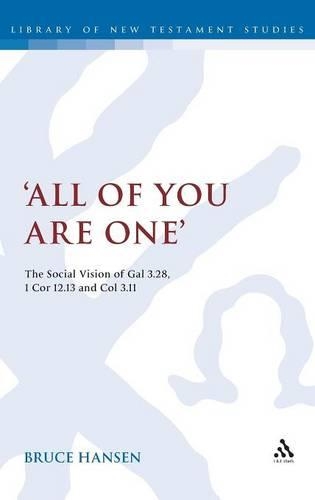
'All of You are One': The Social Vision of Gal 3.28, 1 Cor 12.13 and Col 3.11
(Hardback)
Available Formats
Publishing Details
'All of You are One': The Social Vision of Gal 3.28, 1 Cor 12.13 and Col 3.11
By (Author) Bruce Hansen
Bloomsbury Publishing PLC
T.& T.Clark Ltd
19th November 2009
United Kingdom
Classifications
Tertiary Education
Non Fiction
Criticism and exegesis of sacred texts
New Testaments
227.06
Physical Properties
Hardback
256
Width 156mm, Height 234mm
522g
Description
Hansen argues against prevalent views that the unity formula employed in Gal 3.28, 1 Cor 12.13 and Col 3.11 reflects either a Hellenistic anthropology of ideal androgyny or a modern liberal conception of social equality.
Rather, Hansen contends, attention to function and context demonstrates each epistle's vision of social unity. Insights from ethnic theory elucidate how epistles characterize this unity in terms of a new social identity, and the practices warranted by that identity. Furthermore, Hansen claims that because identity construction is continual, dynamic and discursive, alternate identities (e.g. ethnic, gender, religious, economic) within the new Christian communities, may be seen as influencing one another and may be termed as the collective Christian identity.
Hansen employs theories from Ethnic study as tools for assessing how such overlapping identities persist and interact with one another. His analysis thereby demonstrates that the social unity promoted by this formula opposes cultural dominance by any particular group and, conversely reinforces the persistence of marginal social identities within new communities. The issue is then not one of gender equality, but of the equality that Paul wishes to develop between competing social groups.
Reviews
This is a nicely put together, well-argued book... a valuable contribution to discussion of each of these three letters and of the structure of [Pau's] theology overall. -- Journal for the Study of The New Testament, Volume 33 Number 5
... this is an indispensable beginning point for all future studies of eschatology in 1 Thessalonians and in Paul's theology more generally. -- Religious Studies Review
"Perhaps the most prominent refrain the Pauline corpus, says Hansen is the affirmation that unity in Christ overcomes the social division of Jew versus Greek, slave versus free, and other dichotomies. An ordained minister in San Francisco, he explores the background of the idea, its intended purpose for original readers, and its significance to believers today. Among his topics are reading Paul ethnically, the household of faith, the body of Christ, the new humanity, and unity as ethnic solidarity." -Eithne O'Leyne, BOOK NEWS, Inc.
"Based on a doctoral dissertation presented to the University of St. Andrews in Scotland, this investigation of the Pauline formulaic affirmations that unity in Christ overcomes social divisions (Gal 3:28; 1 Cor 12:13; Col 3:11) argues that these texts support Paul's construal of the believers as a new ethnic group patterned on the identity of Israel as reenvisioned through Christ. After a 31-page introduction, it clarifies ethnic theory and rhetoric as a means of enabling readers to recognize better Paul's discursive strategy. Then it examines the three key texts: Gal 3:28 and the household of faith, 1 Cor 12:13 and the body of Christ, and Col 3:11 and the new humanity. Hansen concludes that for Paul the unity formula finds its bearings in reference to the story of God fashioning a new people on the basis of the stories of Israel and of Christ." -New Testament Abstracts, Vol. 54
'By applying the conceptual apparatus of 'ethnic theory' to the Pauline letters, he suggests that Paul attempts to supply his churches with a fictive kinship myth that renders them a new ethnos, drawn from Jews as well as Gentiles, rather than either group being subsumed to the other. In this way, Paul fashions for his churches a 'diaspora identity' (for which Hansen follows D Boyrain), but one that, rather than obliterating social differences between individuals, seeks to create a space that prevents any one pre-existing identity marker (such as circumcision) serving as a normative for all (pace Boyarin). This identity functions within a broadly bounded set of boundary-marking 'indices' that concern avoidance of idoltary and sexual immorality, and adherence to communal solidarity and Christ-like sacrificial love. There is much of value in this careful investigation.' David Lincicum, Mansfield College, Oxford -- David Lincicum * Theological Book Review *
Author Bio
Rev. Bruce Hansen, PhD (University of St. Andrews) is an ordained minister at San Francisco Christian Center and has been a campus minister with InterVarsity Christian Fellowship in the San Francisco Bay area for twenty-three years.
